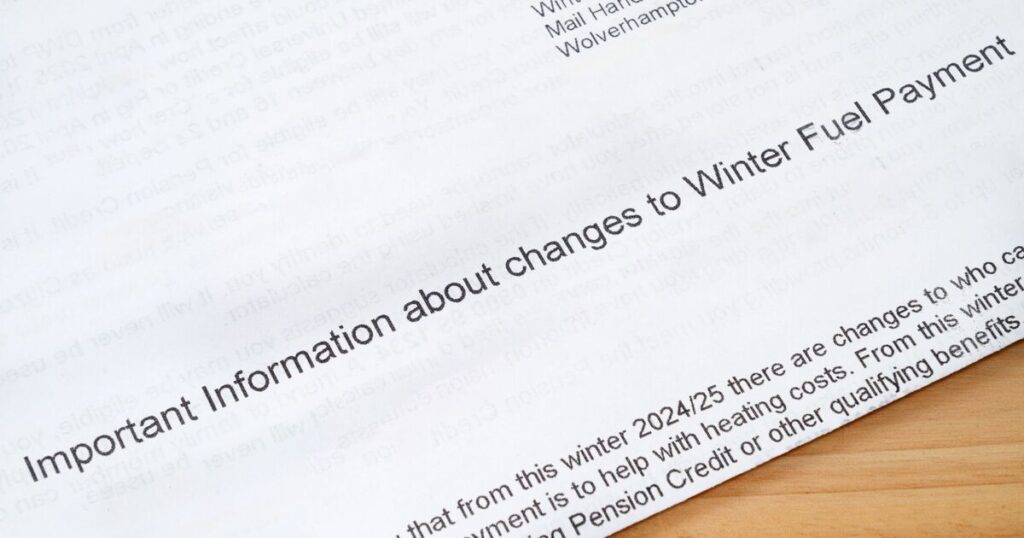
The winter fuel payment for state pensioners could be scrapped altogether, according to the Institute for Fiscal Studies (IFS).
Following Prime Minister Sir Keir Starmer’s announcement that the government is going to re-examine the thresholds for the £200 to £300 payments for state pensioners, the IFS has looked at the options it says are available to the government, from widening eligibility to scrapping the benefit altogether.
The £200 benefit, or £300 for over-80s, was first introduced by Labour in 1997 but was scaled back by Rachel Reeves last year, so that it is now only available to those who claim income support benefit Pension Credit, instead of being paid to all pensioners automatically.
Following months of uproar about the means tested changes, Starmer has now pledged to look at the thresholds for the winter fuel allowance but no further details have yet been given for how much the threshold could change by. The IFS has issued a report, Expanding winter fuel payment Eligibility, which outlines the options available.
Among its suggestions, it says that the ‘simple option’ would be to reverse the changes and give WFP back to all pensioners at a cost of about £1.5Bn.
Or, a new means tested system could allow households not claiming Pension Credit to claim WFP, the IFS says, although this could be expensive to implement and some still may not claim.
Third, the government could make Pension Credit ‘more generous’ by withdrawing Pension Credit more slowly when a pensioner receives income, instead of by £1 for every £1 of income as it is currently.
Other options include making WFP an individual payment rather than a household one, or expanding to other benefits instead of just Pension Credit, such as disability benefits. Or, the IFS argues, the model proposed by Martin Lewis could be implemented, which bases eligibility on council tax bands A to C.
But the IFS concludes that there is no easy solution and all options are complex, and instead, it may be simpler ‘not to have WFP at all’.
The report says: “If the government wants to expand WFP eligibility – without returning to the old universal system – there are no particularly easy answers to increase eligibility substantially.
“Expanding eligibility to those on housing benefit (and/or disability benefits) would increase the numbers receiving winter fuel payment but still leave the vast majority of pensioners ineligible.
“Going further would either involve creating a new means-test or basing eligibility on other characteristics of the household. It is fair to say that all of these are imperfect solutions – they do not expand eligibility much, or are not closely targeted towards poorer households, or impose large administrative or fiscal costs.
“In light of this, it is worth stepping back and asking what role the government wants WFP to play. One option would be not to have WFP at all.”
It adds: “While it is labelled as being about fuel, it is ultimately just a cash payment (though some evidence suggests the labelling does increase fuel consumption).
“Insofar as the goal is to help people on low incomes, a more straightforward option is to increase Pension Credit; if the goal is to increase pensioners’ incomes more generally, one could simply raise the state pension generosity (though this would imply redistribution from singles to couples, and the government might rather avoid that). Perhaps before it tries to tweak eligibility awkwardly, the government should consider what question WFP is the answer to.”
Tom Waters, an Associate Director at IFS and author of the comment, said: “There are two natural options for assessing winter fuel payment eligibility – giving it to all pensioners or restricting it to those on a means-tested benefit. The government’s reform was to go from the former to the latter, using pension credit receipt as the passport to eligibility. Middle options that significantly increase eligibility are tricky: they come with a significant price tag, or are not well targeted at low-income households, or are administratively costly. There is a clear risk to adopting a clunky bureaucratic mechanism for what is, ultimately, a relatively small payment.”
 Latest World Breaking News Online News Portal
Latest World Breaking News Online News Portal






